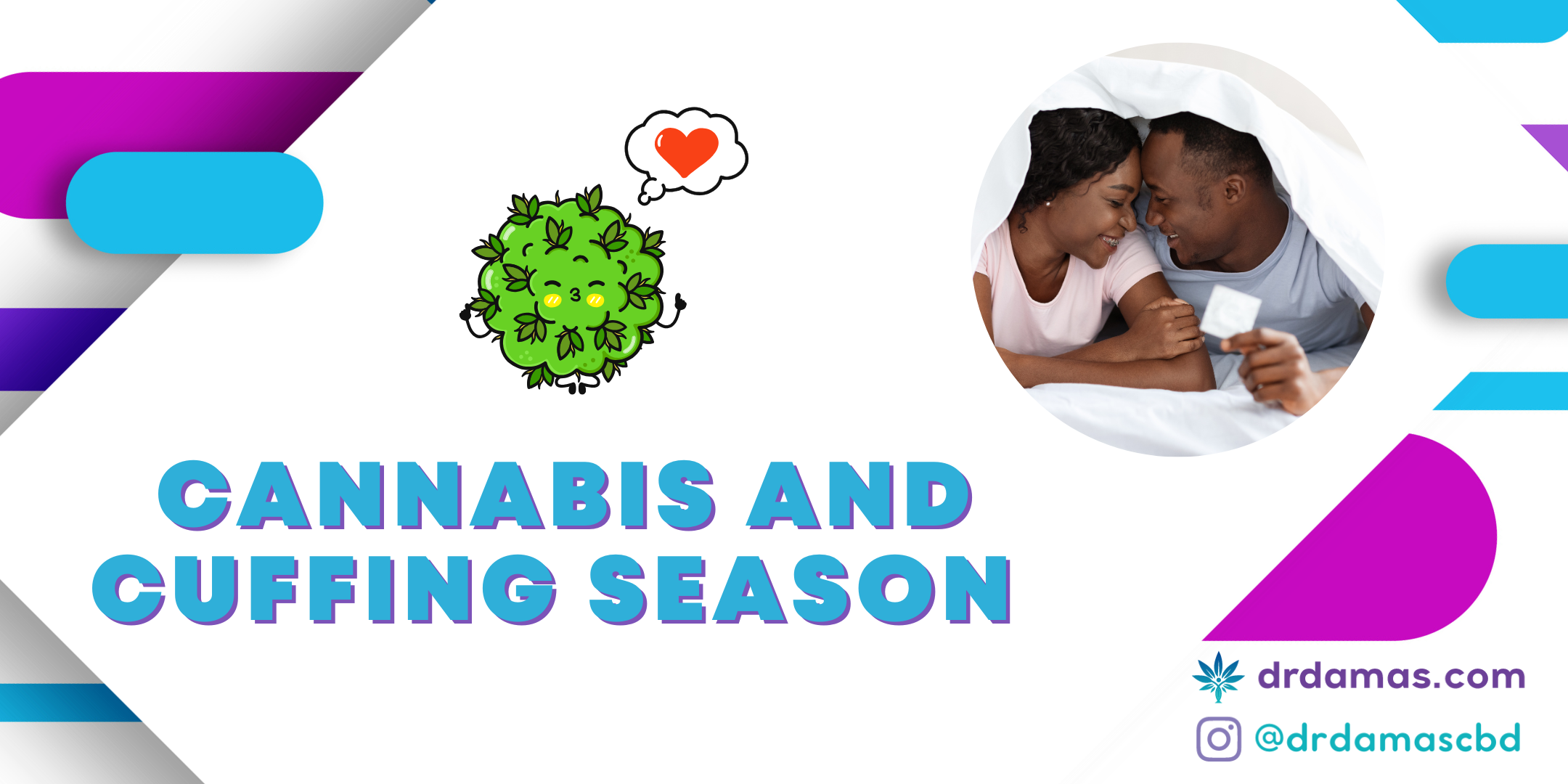Cannabis and Cuffing Season: The Science of Love, Winter Blues, and CBD
When I first got to Buffalo for my brief stint with the Bills, I remember people constantly telling me the same version of the same motif: ain't nothing to do in Buffalo but eat wings and have sex- it’s too cold to do anything else 😂. This was in 1995, fast forward to 2013 and I was going through my first Chicago winter while in Med school and hearing the same thing. Winter’s coming, it’s time to lay up with your honey.
As the colder months roll in and days grow shorter, you might notice your social feed buzzing with talk of "cuffing season." I’m Generation X, so that's not a term my people use but it describes a particular phenomenon. What exactly does this term mean, where did it come from, and how does it relate to our biology, mood, and even cannabis? As a physician and advocate for holistic health, I’m here to break it all down, supported by science, and to share how cannabis and CBD can help you navigate these intimate winter months. Who knows, you may even be fruitful and multiply 🤗
What Is Cuffing Season and How Did It Start?
Cuffing season refers to a time during late fall and winter when people seek out short-term romantic partnerships to combat loneliness, stay warm, and get through the colder months with someone by their side. The term "cuffing" comes from the idea of being "handcuffed" or tied to someone, though not literally! (or maybe literally 😈)
While the term is relatively modern, the concept isn’t new. Previous generations referred to similar behaviors using phrases like “settling down for the winter” or even joking about finding a “winter boo.” The idea aligns with human evolutionary patterns, where seeking companionship during harsh seasons increased survival rates.
Pearls
The term "cuffing season" may be new, but humans have instinctively sought companionship during winter for thousands of years.
Studies show people experience more emotional highs and lows during winter, which can trigger an increased desire for intimacy.
Cuffing Season and the Endocannabinoid System
What drives our urge for connection during the colder months? Part of the answer lies in our endocannabinoid system (ECS) and neurotransmitters like dopamine, serotonin, and oxytocin. The ECS regulates mood, sleep, appetite, and even social behaviors, and it’s especially sensitive to environmental changes like reduced sunlight.
During winter, sunlight exposure decreases, which can lower serotonin production and increase feelings of sadness or Seasonal Affective Disorder (SAD). Physical proximity, intimacy, and social bonding release oxytocin, sometimes called the “love hormone,” which counteracts these effects. Research also suggests that the ECS plays a role in oxytocin signaling, reinforcing the connection between cannabis, mood, and social behaviors.
Pearls
Your endocannabinoid system interacts with neurotransmitters like serotonin and oxytocin, which play key roles in mood and bonding.
Lower serotonin levels during winter can contribute to SAD, which affects about 5% of the U.S. population.
Birth Peaks, Winter Blues, and Physical Proximity
Here’s an interesting fact: there’s a noticeable spike in births during the summer months, which aligns with increased physical intimacy during cuffing season. While this isn’t a hard rule, studies have found a correlation between colder months, increased proximity, and higher conception rates. This makes sense when you consider that humans naturally seek closeness and warmth when temperatures drop.
Physical intimacy doesn’t just increase feelings of happiness—it also releases endorphins, which reduce stress and help combat the winter blues. Combined with quality sleep, exercise, and healthy lifestyle habits, spending more time with loved ones can make a meaningful difference in mental health during the darker months.
For women, the benefits of intimacy are particularly notable. Studies have shown that women experience increased levels of oxytocin and dopamine during physical connection, which can help reduce symptoms of anxiety and depression. A 2020 report from the Journal of Sex & Marital Therapy found that women who engaged in regular intimacy reported a 36% reduction in stress levels compared to those who didn’t. These statistics highlight the powerful mental health benefits that intimacy can offer.
The Impact of Intimacy on Black Women’s Mental and Physical Health
For Black women, intimacy can play a vital role in mental and physical health, serving as a protective factor against stress and chronic conditions. Studies show that social support and emotional closeness significantly reduce the effects of stress on Black women, who often face unique systemic challenges, including racial discrimination and economic inequities. Intimacy—both emotional and physical—can promote oxytocin release, which lowers cortisol levels, a key stress hormone linked to hypertension and heart disease, conditions disproportionately affecting Black women.
Research also highlights that strong interpersonal bonds and fulfilling intimate relationships can improve mental health outcomes for Black women, reducing symptoms of depression and anxiety. For instance, a study published found that Black women with greater emotional and physical intimacy in their relationships reported higher levels of life satisfaction and lower levels of psychological distress. This underscores how healthy intimacy isn’t just about connection; it’s a powerful tool for holistic well-being.
Pearls
Birth rates peak in the summer, indicating increased intimacy during the winter months.
Women experience a 36% reduction in stress levels through regular physical intimacy, thanks to increased oxytocin and dopamine release.
Cannabis, CBD, and Cuffing Season
Cannabis and CBD offer powerful tools for navigating cuffing season, winter blues, and SAD by working directly with the endocannabinoid system to restore balance. Let’s break down how cannabis and CBD can help, along with the best routes of administration for each.
CBD for Mood and Stress
CBD, the non-psychoactive compound in cannabis, helps regulate mood and reduce stress by interacting with ECS receptors. Research has shown that CBD can increase serotonin availability in the brain, making it a natural option for alleviating symptoms of depression or anxiety related to SAD.
THC for Relaxation and Intimacy
THC, the psychoactive compound in cannabis, promotes relaxation and may enhance intimacy by lowering inhibitions and increasing sensory awareness. However, those new to cannabis should start with low doses to avoid unwanted effects.
Routes of Administration
Tinctures and Oils: Taken sublingually, these provide quick, precise relief for mood and anxiety.
Edibles: Gummies and capsules offer long-lasting effects, perfect for evening relaxation.
Topicals: Creams and balms can ease physical tension, which may indirectly enhance closeness and comfort.
Intimate Oils: Cannabis-infused intimate oils can enhance pleasure and intimacy by increasing blood flow, reducing tension, and promoting relaxation. These oils are applied topically, offering localized effects that can heighten sensation and connection.
Vaping or Smoking: These methods offer fast relief but may not be ideal for everyone, particularly those with lung sensitivity.
Cannabis-Infused Intimate Oils: Enhancing Connection and Wellness
Cannabis-infused intimate oils have gained significant attention for their ability to enhance physical intimacy, connection, and overall well-being. These oils, designed specifically for topical use, work by increasing blood flow, reducing tension, and promoting relaxation in the areas where they are applied. Whether you’re looking to spice up your love life, deepen your emotional connection, or simply explore new ways to experience pleasure, these oils offer a natural and holistic approach.
The benefits of intimate oils go beyond just physical sensation. They can help alleviate discomfort during intimacy, making them especially beneficial for individuals experiencing tension or dryness. The cannabinoids in the oil interact with the endocannabinoid system (ECS) in localized areas, heightening sensitivity, reducing inflammation, and creating a soothing, pleasurable experience. Furthermore, the calming effects of cannabis can help ease mental barriers, such as anxiety or stress, allowing users to feel more present and connected with their partners.
Pearls
CBD can help alleviate winter blues by boosting serotonin levels and reducing anxiety.
Cannabis-infused intimate oils can enhance intimacy by promoting relaxation and increasing localized blood flow.
Wrapping It All Up 🎁
Cuffing season may sound like a trendy phrase, but its roots run deep in human biology and behavior. As winter sets in, the endocannabinoid system, neurotransmitters like serotonin and oxytocin, and our innate desire for connection all come into play. Whether you’re navigating the winter blues or simply embracing closeness during the season, cannabis and CBD can support your journey.
If you’re considering CBD to improve your mood or enhance intimacy this cuffing season, consult with a healthcare professional first to determine what’s best for you. And if you’re ready to explore high-quality CBD products, I invite you to check out DrDamas.com for formulations you can trust.
I’d love to hear from you! If you have any questions or want to share your experiences, feel free to reach out.
Pearls
Cannabis and CBD can work with the endocannabinoid system to support mood, intimacy, and overall well-being during cuffing season.
Always consult a healthcare professional before starting supplements, and choose trusted products like those available at DrDamas.com.



